Ferguson protests: The people who stayed away
- Published
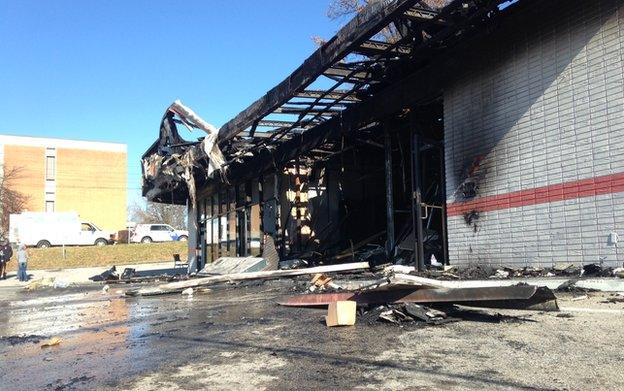
As the residents of Ferguson prepare for another night of demonstrations, there is anger and sadness over the damage already done and fear over what may come.
Picking their way over smashed glass on the pavement, a group of teenagers walk up to workman boarding up shop windows and offer them free doughnuts.
This is South Florissant Road in Ferguson, home to the Ferguson Police Department, which saw some of the worst violence in the demonstrations on Monday night.
Teams of residents of every age and race have been out since early morning, sweeping up debris and helping secure shops and restaurants for what they fear will be another difficult night.
"I'm nervous," says Gina Walsh who is part of "I Love Ferguson", a voluntary organisation set up after the August demonstrations to help residents and businesses who were affected.
"It was a heartbreaking night to watch everything," she says. Gina says there has been huge support, not just from the local community, but from countries around the world, to help provide food and necessities for those affected by the violence.
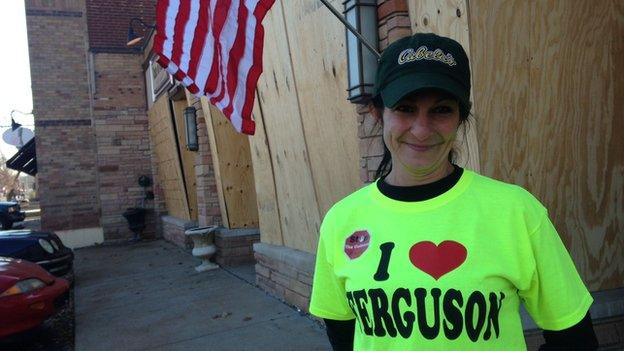
Earlier in the day, she says, a man walked into the office and donated $2000 (£1,270).
"We're thankful because it's especially hard for some of the businesses because it's the second time they've been hit," she says.
Gina says she is relieved the National Guard will be posted in Ferguson tonight.
There's palpable anger among many residents over their absence when the grand jury decision was announced on Monday.
"I'm upset, angry and hurt," says Anastasia Knowles who lives a few streets away from where the demonstrators clashed with police.
A mother of two, she watched as her place of employment, the local Walgreen's shop, was set on fire.
"It was surreal," she says. "Now I'm out of work and my kids can't go to school. It's just heartbreaking."
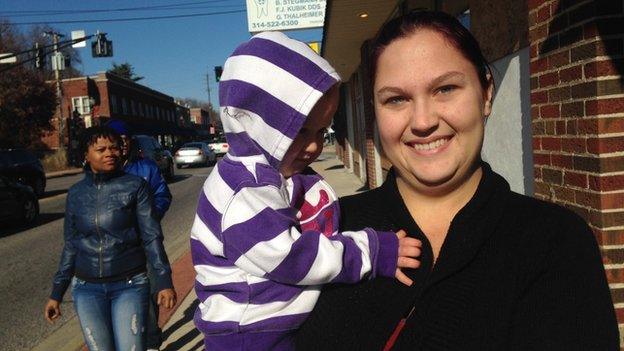
Anastasia cries when she talks to me. Many residents are tearful as they set about securing the main street for what they think will be another night of violence.
Just a short walk away, where shops give way to the affluent detached houses of a mainly white suburb, a resident who declines to give his name is calling around friends making sure they are safe.
"I've lived in Ferguson all my life," he says. "The media hasn't helped us and the government isn't going to help us. They are going to sit back and watch it burn, like they did last night."
The man, who is white and in his 50s, says he believes most of the trouble was caused by people from out of town.
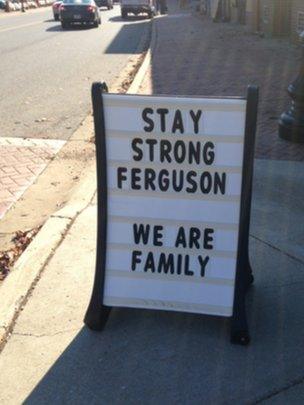
"Personally I think the citizens of Ferguson, black, white or whatever, should find them and put some lead into their head," he says, before driving away.
But a few metres away, past manicured lawns and wind chimes hung from trees, another resident, Jen Maxedon, is more conciliatory.
The mother of three who has lived in Ferguson for 13 years says still loves her community.
"We're here for the diversity. I want my kids to experience it. I didn't want them growing up in 'greener pastures'," she says, referring to suburbs without any black residents.
Jen also believes the trouble was caused by people from outside Ferguson.
She says she can understand the pain of Michael Brown's family, and especially his mother, but the answer is not to say all white people are bad.
"I don't know what it's like to be a black person in a racially diverse community," she says.
"I have friends who are bi-racial couples and sometimes they get stopped by police and I get that," she says.
"But I also know and love many police officers who are good people."
Like last night, Jen is planning to leave home with her husband and children and stay with friends.
"It's not worth staying just to protect our TV," she says.
Anastasia says she plans to stay at home, but listen to the police scanner and evacuate by car if the protests get too close.
But another resident, Trell, a black man in his 30s, tells me he will be out with the protesters.
"Some of the white people here are not racist," he says. "But most of them are."
"Look at the old houses here," he says pointing to homes with plaques showing the date they were built. A hundred years ago, he says, these homes would have had black people working in them. "And things haven't changed much since then."
As the afternoon sun creeps towards the horizon, the group of protesters outside the Ferguson Police Department begins to grow.
The National Guard has now arrived and around twenty of them stand in a row facing the demonstrators, their riot visors pulled up from their faces.
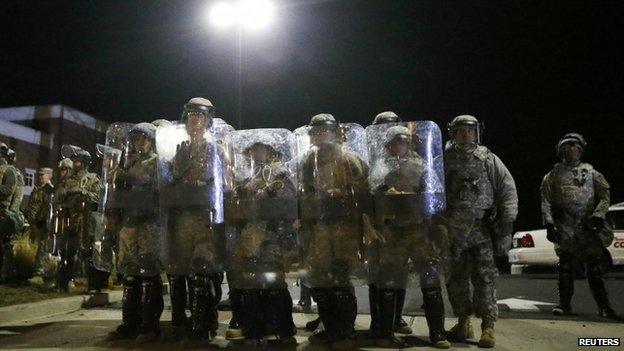
"I hope people realise you don't get anywhere with this violence," says Gina Walsh from the "I love Ferguson" campaign headquarters across the road.
"We are decent folks who live here."
As the night draws in, the folks of Ferguson finish boarding up their businesses and move back to their homes.
They hope they wont see another night like Monday, but they fear Ferguson will be the centre of protests for many nights to come.